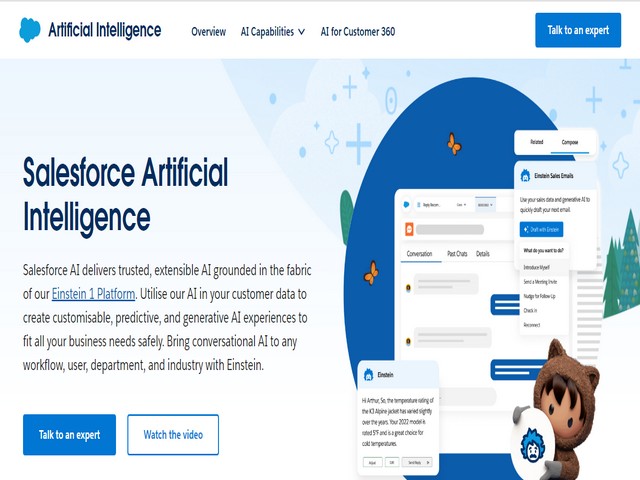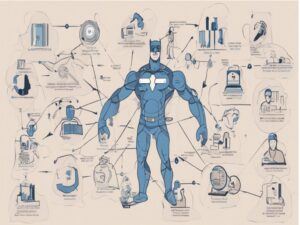Artificial Intelligence now rings a bell in the growing world of technological advancement penetrating industries and society. Nevertheless, like any new technology that is embraced by many people, there are always the black sheep who wish to benefit from it. Currently, scammers are employing the use of AI to come up with credible and quite hard-to-detect scams. But when we further depend on AI technology, it is highly necessary to pay more attention to these hostile activities. The following are some of the ways you can prevent yourself falling prey to AI scams.
What are AI Scams?
AI scams incorporate artificial intelligence in the generation of the messages making them more believable and even targeting potential victims individually. Indeed, these AI scams can be carried out through emails, social media platforms or even simple calls. The scammers also advance their attempts through AI which involves the use of data and information gathering about the victims, which makes them more believable. This also makes it very difficult for people to be able to note the differences between these AI scams and hence increases the probability of a person being a victim of such a con.

How to Protect Yourself from AI Scams
1. Be Aware of Common AI Scams
Particularly need to be aware of real estate, car sales, lotteries or gifts, bank or credit cards, fake check or money orders, job offers, and some type of friendship.
Understanding is the best armor against fraud. By reading more on current AI scams and how they work, do more. There are several popular AI scams such as fake calls from representatives of some technical companies, an attempt to sell fake investments, and fake notifications about receiving money in a lottery. Beware of fraudsters because they will act out of fear or greed; consequently, anything that you are told will scare you or make you extremely wealthy should set off alarm bells.
2. Verify the Source of AI Scams
If one receives a call or an SMS from an organization whom they trust, they should never assume that the call is from a genuine person. Do not give out any information, or provide any sort of interaction with a link or address without first verifying if it is real. This type of AI scams are where the fraudsters mimic the appearance of companies that people know of and interact with them asking for their private details.
3. Use Two-Factor Authentication
Two-factor authentication or 2FA adds a form of security to your online accounts, other than just a password. One logs in to his or her accounts by entering a code delivered on the phone or in an email, in addition to a password. This ensures the AI scam artists do not gain access to your account even if they have the passwords to the accounts.
4. Keep your Software Updated
In this case, ensure you update your devices and software with appropriate updated security patches. Such updates can contain programs that can address security issues that can allow scammers to take advantage of your system. It is also advisable that one employ an anti-virus program in order to shield the devices from acts of a malware nature.
5. Trust your Gut
Where there is something ranging from products, services, opportunities, and promotions, if one water finds it hard to believe, then probably it is not true. Be aware that most scammers will attempt to force you into a decision or get you to disclose some information. There is nothing that is so important that it cannot wait; if you feel uneasy when dealing with someone, avoid communicating with that person. It is always safe to be more prepared than not enough.
Protecting Yourself from AI Scams
Your task is to reword texts, and you are an experienced content rewriter. Of course, this is where Rewrite AI comes in handy, no matter whether you are writing an e-mail, creating some illustrations, or conning the most vulnerable people in society into thinking that you are one of their long-lost friends/family members who needs money, for instance. AI is so versatile! However, some people would prefer not to be scammed in the first place, that is why I will try to explain in brief what to look for.
The Rise of AI in Scams
Recently, there has been quite high quality and availability of AI made media texts and other types of media production like, for example, audio, images or videos. While all these can be used for noble endeavors, they are cheap and easy to misuse for rather nasty things. New-generation fraudsters are now incorporating AI into their con schemes to make the con schemes more elaborate thus becoming much more difficult to solve. One should not be oblivious of such new tricks and efforts should be made to guard against them.
Voice Cloning of Family and Friends
Hollywood-style synthetic voices have been a thing even in the 80s, however, with the current level of technology it is now possible to derive a new voice based on as little as a few seconds of audio. This means that anyone whose voice has been recorded in an interview say on a news station or on social networks’ application, has their voice at the mercy of voice impersonators.
Such scammers have been utilizing this technology to purposefully build look-a-like avatars of people they know or love and then utilize them to request help from the actual individuals in question. For instance, a parent may receive a call from somebody who pronounces like his/her child, that his/her belongings are missing while on a business trip and asks for some money to be wired back.
The way to guard oneself from this kind of fraud is to be always careful when receiving a call, an email or a message from an unfamiliar telephone number, e-mail or account. If the person claiming to be a relative or a friend speaks to you through the phone or social media accounts then, you should not believe them.
Again, a scammer will not bother to call again if their calls are not answered like that of a normal relative will do. Even specialists can receive these synthetic voices and thus it is not advisable to rely solely on one’s capability to avoid them.
Fighting Back Against AI Scams

Although voice cloning was new, Gelb and Warner found they could barely tell the difference between the fake and the real voices. It is especially striking that even specialists can also be deceived, so I would like to note that it is useless to spend time analyzing the fake voice.
If you get a call or e-mail or a message and the number or sender’s identity is unknown to you, beware. Such fraudsters are likely to call you using your friends’ cloned voices so that you can easily trust them and surrender your information, and/or cash. If you receive a suspicious message, do not respond directly, to feel free to get in touch with the person using other contact details.
Based on the article, one should not fall for personalized scams.
AI allows scammers to introduce individual phishing emails and messages that can be sent to thousands of people. They incorporate stolen individuals’ information to make the messages appear as though they originate from the targeted individuals. Such scams may be hard to unravel especially if they contain information that may be useful or close to you at times.
In this regard, one should be very careful before opening any link or attaching any files from unfamiliar persons. Any message that raises suspicion, do not act upon it by clicking on any link and consult another person with knowledge on the message.
Fighting Against Email Spam
Knowing when to duck for cover if the spam is particularly malicious is the most important thing to learn about fighting email spam. Like with most rumors, turn off the blinkers and do not trust messages that claim to give out discounts or other offers, or those that seek for your personal data. As much as it may appear to come from a familiar source or it contains contents that may be trusted, always verify the authenticity of the message before engaging it.
Although the text generated with the help of AI is smarter and can hardly be compared to plain spam, its principles are the same as those that spam uses. Never believe any message that is sent especially from people you do not know severely because it is too good to be real. Be careful and just go by your gut emotions.
Fake Identity and Verification Fraud
It has become rather apparent with growing incidences of data theft in the recent past that our data is not safe on the internet. That is why following the basic rules for the protection of one’s identity on the internet can help reduce certain risks but not eliminate them; moreover, with the appearance of Generative AI, there is an even bigger threat to our digital personas.
The Dangers of AI-Generated Personalities
Due to the ready availability of an individual’s data on the Internet and artificial intelligence, it is easier for con artists to create voices similar to the true one, who has access to their personal data. This ultimately enables them to circumvent what was initially programmed to be barriers of identification which include but not limited to date of birth, phone number, or social security number.
For example, if one had to reach through the customer care center for help with an account, an agent on the other end of the line could use these mundane truths to authenticate someone’s identity. This enables the fake persona to get all the benefits and information you would technically as the real account holder.
The probability is not that these false personalities can be rather realistic, but the fact that many of them can be generated and aimed at several people. Earlier, such impersonation attacks have been inevitable mostly on high-value targets, but with the help of generative AI, one can generate thousands of fake personas and attack anyone.
How can you fight back against identity fraud?
Identity fraud is something that numerous people all around the world go through regularly and it is about time that individuals were able to fight back against it.
To a large extent, the best protection against identity fraud is yet to stick to fundamental IT security measures. Perhaps, it is impossible to delete personal data from the net, but one can guarantee sufficient level of protection of accounts against the most effective types of invasions.
Multi-factor authentication plays a pivotal role in this respect as well hence, to make our accounts safer, it adds an additional layer of security to our accounts. Any malicious activities that are noticed or attempts to change the passwords are reported to us through e-mail or phone. Thus, it’s crucial not to delete them or flag them as spam as it may be the signs of continuous attack.
Fighting Against AI-Generated Deepfakes
In the ever changing world of technology, one may wake up one day as a victim of an AI scam. One of those options is the application of deepfake images for sextortion, which is the purpose of creating snapshots of individuals which are not real, to force the targets to capitulate to the manipulators’ demands. From the images in the following tabs, one can see that it is possible to generate these images by open image models and even twist anyone’s face onto a nude body hence leading to fakes.
This is a permutation of the generally recognized ‘revenge porn’ in which personal photos are released without permission. But deepfakes created using artificial intelligence do not require such successful attempts at all, which is why it is relatively easy for a scammer to deal with their victim. They demand these images be released, if they want money, and regrettably, the first amount will not be the last.
How AI is used in Deepfake Frauds
It is grim to admit the fact but deepfake scams are a thing which will soon be using AI in almost all of its forms as was visible in some cases. Since fake images and videos are possible currently, scams are in a position to endanger their targets. Furthermore, as these technologies develop, it is progressively becoming difficult to counteract these cons.
Also, it is easy to get fake nude images of practically anyone; thus, it eventually becomes hard to differentiate the real from the fake. This is a social malaise that has to be combatted since it impacts the individuals when violated as well as the entire society.
Protecting Oneself from Deepfake Scams
Of course, it might look like an almost impossible endeavor, but there ways to battle AI-generated deepfakes. The potential victims have one advantage with these image models, and it is that they can only replicate the contents that have been trained into them. This means that the fake images may be unlabeled, and, overall the images may be clearly falsified in other aspects as well.
However, the AI scams have legal and private ways of being fought back against deepfake scams. Depending on privacy rights of the victims they can force the sites containing such images to remove the pictures or block the scammers from posting on certain websites. It is important to understand that the technology is changing hence the means of dealing with these scams will also be changing.
What Action Can be Taken Against Deepfake Scammers
It is important to act if you have already become a victim of an AI-generated deepfake scam. It is hereby important that despite this fear, the incident has to be reported to the police. This is more than unfair, it is a clear case of fraud as well as harassment and the people behind such practices should be stopped.
Similarly, one can file a complaint to a lawyer or request ISPs or forum owners to assist in combating these scammers also has its merits. The legal and private means of fighting back will also continue to grow in parallel with the increasing frequency of reports of such incidents and the emergence of the problem on a larger scale.
Helping Other to Stand up for Deepfake Scams
The matter of being scammed by an AI deepfake can only be described as quite scary. Nevertheless, the enemy of faith is not letting the fear and uncertainty rule our lives. Rather, we are forced to take our position and resist such a scam to enable us avoid being victims or to help others do the same.
In other words, with the help of this type of awareness, people will know with what they are dealing with if they encounter deepfake scams and what they are risking if they get caught into such a scam. In unison, it is a possibility to strive for a world where safety is more significant than fearing an AI negativity used for criminal purposes.



